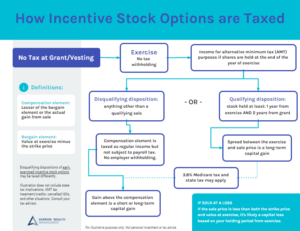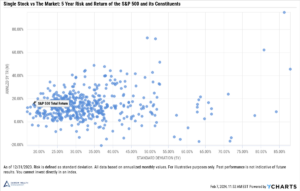Updated for 2023. If you have nonqualified stock options (NQSOs or NSOs) it is important to understand how your stock options will be taxed and what responsibilities you have to report the income. Managing equity compensation requires proper planning to avoid unwanted surprises and tax consequences. Here’s what you need to know about how non-qualified stock options are taxed.
Tax implications when exercising non-qualified stock options
There are generally no tax consequences at grant or vesting of NQSOs, but exercising incentive stock options is a taxable event. At exercise, the amount typically included in regular income is called the compensation element. This equals the current market price minus your strike price, multiplied by the number of shares you’re exercising.
Generally, federal tax withholding at exercise is required. If the spread is under $1M, the statutory federal tax rate is 22%, if above, it’s 37%. If your state has an income tax, withholding is likely required too. The compensation element is also subject to payroll taxes. The statutory withholding may not be enough to cover your tax liability, though. Further, there may not be withholding for individuals who were/are not classified as employees, such as independent contractors or consultants.
You will want to discuss your plans with your financial advisor and CPA before to exercising or selling stock options.
Tax treatment at sale
When you sell NQSOs for a gain, it will trigger short or long-term taxable capital gain depending on your holding period. If you exercise and sell the stock right away, you shouldn’t have a capital gain, only the compensation element.
Stock held for one year or less is a short-term capital gain. The tax rates on short-term capital gains are the same as ordinary income. Longer holding periods will benefit from more favorable long-term capital gains rates.
At a high level, the capital gain is based on your sale price, less your cost basis. For simplicity, you can estimate your cost basis as the market price when you exercised. Again, it’s important to work with a CPA to run the numbers for you. Estimated quarterly tax payments may be required to avoid penalties.











